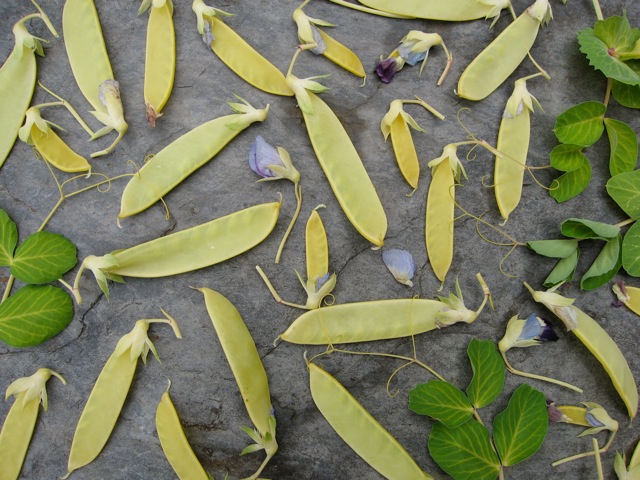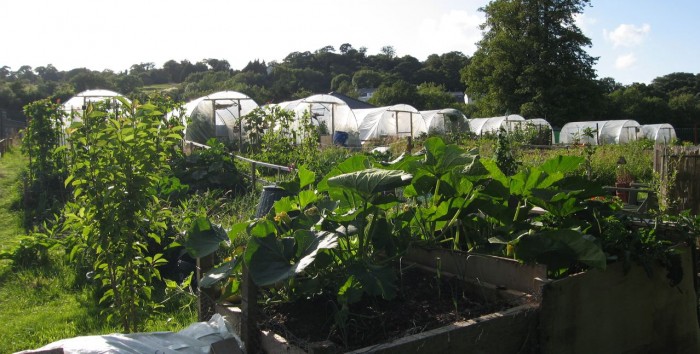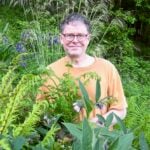Letting the GM genie out of its biotech bottle hasn’t just changed day-to-day life on our allotments, it’s now taking over control of life itself.
They’ll be here soon. The moment – preceded by a warning bleep – that the clinical, electronic voice announced, “Patent violation detected. Please submit immediately to your BeyondNature crop analyst and await further instructions,” I knew it was all over. Not “refer to”, “submit to”.
I’m a ‘bleeper’, you see. The one thing you can’t fault BeyondNature on is their efficiency; all they do is feed a seed into their hand-held Patent Violation Detector (PVD) and a few minutes later, after swapping signals with an orbiting satellite, it gives its verdict: guilty as charged – or a permanent listing in their database of potential violators. ‘Innocent’ and ‘Sorry to have inconvenienced you’ are not phrases that the PVDs, or those dabbing their shiny touchscreens, are familiar with.

At first I thought I’d got away with it; there were no pea seeds left on my plot to test. But I didn’t bank on one of the prags dobbing me in, or on BeyondNature’s latest generation of PVDs, which can detect ‘violations’ by analysing just a fragment of leaf, stem or root. The roots; I should have remembered the roots.
They’re nice enough, the BeyondNature analysts. They smile a lot, couldn’t be more polite. The only chink comes when you ask them if, in order to do their jobs, they’ve been genetically modified themselves. The worst, but also the most efficient, are the ones who know how food gardening works. One of our previous allotment monitors (we don’t call them secretaries any more) became a BeyondNature analyst. The old boys loved it, but for many he went overnight from being the salt of the earth to… well, something else of the earth. Me, I never fell for the salt-of line; he was too much of a glyphosate fan for my liking, always encouraging the fresh and uninformed to splash the stuff about. “But it’s eco-friendly, and you don’t want to be seen to be going against what we do here, do you? We’re a friendly bunch – if you stick with what works.”
He’s a classic ‘prag’ – our tag for the so-called ‘pragmatists’. These are the folk who have no time for anything that threatens either their plot’s productivity or their concrete mindsets – the sort that proudly pin magazine articles called ‘Roll on, GM’ to their shed walls. Their plots aren’t for connecting with nature, for sowing thoughts as well as seeds, or about cultivating any kind of ecological awareness. The prag plots are all about control, neatness, order, and that mother of all cop-outs, pragmatism. There’s nothing they don’t know, and if they come upon something they don’t understand – or don’t care to understand – and which can’t be ‘proven’, then it’s time to bring on pragmatism. They’ve a lot to answer for.
Some of us had a laugh once – our mad night in the moonlight, we called it – by putting ‘Nature keep out’ signs on the prags’ plots. Those were the days, before the BeyondNature CCTV cameras arrived, perched on the taller ‘biosecurity’ fence they’ve paid for. There’s no such moonlit mischief any more; the cameras have night-vision.
Everything changed with the arrival of the new seed catalogues in autumn 2020. We knew it was coming, as seed companies’ once rock-solid promises never to sell genetically modified plants had quietly slipped away. It wasn’t any surprise to see global hortigene businesses buy up firms that had served generations of gardeners; the small print in the catalogues of Mr Cleggeron’s Seeds, Sweeps Seeds and Seeds for You shows they’re all now owned by BeyondNature. Did our gardening magazines make a stand? Did they heck. Advertising deals, as ever, helped to oil the silencing of those who should have spoken out. Greed finally kicked away the struts of the few publications which did try to make a stand. There are plenty of grow-your-own magazines about, but there are no prizes for guessing who now publishes them.
We ‘freeseeders’ work on the edge of what’s lawful. Those of us who refused to accept the GM spin decided we would grow and share, for free, the seeds of non-GM plants, mostly vegetables. Then the government, under pressure from the hortigene sector, decided, in the interests of ‘commercial competitiveness’, that all seed movements, including those sold to or shared between gardeners, would be subject to ‘track and trace’ regulations. So much for the idea of a ‘big society’ (which, as it turns out, was a polite way of saying that big business will be allowed to run society – even down to telling us what we can grow).

Those of us brave enough to stick to the freeseeder path were quietly but determinedly ‘relocated’ to the nether regions of allotment fields, with the prime plots being given to those ordering PerfectPlot Seeds. It was never voiced, but the deal was either relocate or get out. We saw that coming, too; one of the most pernicious ‘big society’ outcomes was that multinational seed companies, dressed up as our familiar favourites, offered to fund the upkeep of allotment sites. When a few of us bothered to check the small print and found that their support was dependent on plotholders buying only genetically modified, glyphosate-resistant PerfectPlot Seeds, we knew there was trouble ahead.
In this brave new gardening world, all PerfectPlot varieties are genetically engineered to be resistant to glyphosate weedkiller – meaning that the prags can drench their pristine plots in the stuff to their hearts’ content (although with crude oil prices rocketing, it isn’t cheap). There are no worries about pests or diseases either; gene-popping has seen them off. That bird and beneficial insect populations are crashing holds no sway with BeyondNature: ‘Our products have made growing your own easier, more consistent and more reliable than ever before.’ Oh, and you’re not allowed to save any seeds from them (you automatically enter into this dark, internationally-binding legal covenant upon purchase of the packet).
But no one thought to mention any of this to the few bees we still have left. They don’t have a PVD handy when they’re out visiting flowers. If they had, perhaps they’d have known not to carry pollen from the flowers of PerfectPlot mangetout pea ‘Pod Perfect Strain 8.2™’ down to those of my golden-podded mangetout, which have been saved in my family for three generations. They had no name, no trademark, no owner, just a custodian – until now. As soon as the first grains of BeyondNature-engineered pollen were carried inside my pea flowers, they were gone. I didn’t own the patented ‘tracker’ gene carried in the pollen, but it was my responsibility to make sure it didn’t reach or pollinate my pea plants.
That’s why I’m a bleeper. It’s why my plot has just been surgically cordoned off, and why our allotment monitor has just handed me notice to quit, with immediate effect. It’s why all my crops are now subject to a Patent Restraint Order and are in the custody of BeyondNature; why I face a court appearance, possibly a hefty fine, and why I’ll get a lifelong entry on the National Patent Violation Register (Allotments).
Some of us always knew that pushing nature beyond its limits would come at a very high price.
Text and images © John Walker


